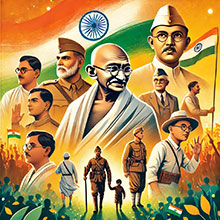A Journey Through India’s History and Cultural Ethos

Why has India seen the fusion of so many different cultures, and why do Indians excel around the world? Why do Japanese companies often struggle in business with India? The key to understanding these questions lies in delving into India’s history and culture and developing a deeper understanding of the Indian people.
Early Encounters: From Alexander to the Islamic Conquests
In 326 BCE, Alexander the Great’s incursion into India marked one of the earliest interactions between India and the Western world. This period highlighted India’s remarkable ability to absorb foreign influences while preserving its cultural identity. The Mughal Empire, beginning in the 8th century, merged Persian art, architecture, and administration with Indian traditions, creating a golden age of cultural synthesis.
Colonial Encounters and Global Integration
European colonialism in the 15th century marked a new global phase for India. The Portuguese arrived first, followed by the Dutch, French, and later the British. The British East India Company evolved from a trading entity into a political force, leading to the British Raj’s establishment in 1858. British rule had mixed effects: it brought economic exploitation and de-industrialization but also introduced Western education, legal systems, and governance concepts. English spread, creating an educated class pivotal in India’s independence movement and the shaping of modern India.
By this time, India had become a mosaic of religions—Hinduism, Islam, Sikhism, Christianity, Buddhism—and cultures, with over 22 languages and varied food practices. The British era also saw Indian migration to other parts of the British Empire as laborers, merchants, and professionals, laying the foundation for the global Indian diaspora, embodying adaptability and respect for diverse cultures.
Post-Independence India: A Global Presence
India’s independence in 1947 marked a new era, focusing on cultural revival while embracing modernity. Under Mahatma Gandhi’s influence, the nation led the Non-Aligned Movement and took an active role in global institutions. The economic liberalization of the 1990s accelerated India’s integration into the global economy. As a rising hub for IT and services, Indian professionals migrated to the West, enhancing India’s global reputation for talent and innovation.
Today, the Indian diaspora is among the largest in the world, with over 30 million people living abroad. Non-Resident Indians (NRIs) contribute significantly to their adopted countries while preserving cultural ties through festivals, cuisine, music, and yoga. India’s diverse culture, religion, and philosophy, particularly Hinduism’s focus on ‘Karma,’ emphasize the importance of respecting and adapting to one’s adopted land as a motherland.
The Indian Cultural Ethos: Embracing and Integrating the Global
India’s ability to integrate into global societies stems from its cultural values of tolerance, adaptability, and respect for diversity. The ancient philosophy of “the world is one family” embodies an openness to differences, fostering confidence, fearlessness, honesty, loyalty, and fairness. A strong belief in God and karma drives Indians to accept outcomes as part of life’s process. This ethos is exemplified by Mr. Pal Hanji, a renowned Indian lawyer in Tokyo, who supported Japan wholeheartedly.
India’s pluralistic religious landscape—Hinduism, Buddhism, Jainism, Sikhism, Islam, and Christianity—has shaped a society valuing spiritual inquiry and mutual respect. This diversity equips Indians to integrate into various global contexts, from multicultural societies in the United States and Europe to more homogeneous ones like Japan.
India’s spiritual traditions, philosophy, Ayurveda, and astrology are profound yet not fully exposed to the world. Ayurveda, along with yoga, offers significant potential for future healthcare, and India is actively reviving these practices. This renewed interest presents opportunities for Japanese companies to enter the Indian market with complementary healthcare solutions like “Kanpo.” Indian astrology, grounded in scientific principles, provides insights into human characteristics and life events. India’s ancient Vedic mathematics further highlights its deep roots in science, technology, and rational thinking. As a data-driven nation, India continues to showcase its intellectual depth globally.
India’s story is one of cultural resilience, openness, and integration, where ancient traditions blend seamlessly with modernity. Its journey through early encounters, colonialism, independence, and globalization demonstrates a unique ability to absorb and adapt while preserving its rich cultural identity.
Conclusion
India’s historical journey testifies to its remarkable capacity to embrace diversity, adapt to change, and integrate global influences while maintaining its cultural heritage. From early interactions to modern globalization, India has evolved into a tapestry of spirituality, tradition, and innovation. Its ethos, grounded in values of tolerance, respect, and openness, continues to inspire and guide Indians worldwide. As India moves forward, it carries a legacy of unity in diversity, offering lessons in harmony and coexistence. Today, India stands as a beacon of cultural resilience and global integration.
Profile
Pankaj Garg
CEO Innovation Thru Energy Co., Ltd, (ITE)

Pankaj Garg holds a degree in Computer Science Engineering from the National Institute of Technology and an MBA in Marketing from Fox Business School, USA. He embarked on his journey to Japan 34 years ago and, over the past 34+ years, has built a distinguished career specializing in AI, robotics, semiconductors, applied engineering, and new product invention and development. He has contributed his expertise to prestigious organizations such as Kobe Steel, Yaskawa Electric, Cirrus Logic, Intel, and NASA/Caltech startups. His broad skill set encompasses R&D, engineering, product manufacturing, and global technical sales and marketing.
Pankaj also holds over 30 patents in the areas of semiconductors, green energy, and next-generation energy, reflecting his innovative contributions to these cutting-edge industries.
Driven by a mission to tackle critical global challenges like climate change, food waste, and pharmaceutical cold chain deficiencies, Pankaj set out to create a seamless, globally standardized cold chain logistics system. After leaving Intel, he founded ITE Co., Ltd. in 2007, entirely self-funded. Today, ITE serves over 250 clients globally, with a growing presence in the Indian market. Inspired by Japan’s dedication to innovation and craftsmanship, Pankaj has fostered a culture of excellence, integrity, and continuous improvement at ITE. His guiding principles are drawn from the teachings of Karma (as outlined in the Bhagavad Gita) and Kaizen, along with his extensive global business experience, particularly in the U.S., which shape ITE’s customer-first philosophy.
Pankaj possesses deep expertise in areas such as Digital Transformation (DX), semiconductors, the food retail industry, medical cold chains, pharmaceuticals, GDP/GMP standards, life sciences, cold chain logistics value chains, Ayurveda, yoga, and the food industry. This diverse knowledge has been instrumental in his success across multiple domains, positioning him as a visionary leader in cold chain logistics, climate change initiatives, and the green energy sector. Under his leadership, ITE stands as a testament to his technical expertise, entrepreneurial spirit, and commitment to solving global challenges.
Innovation Thru Energy Co., Ltd.
Since its establishment in 2007, Innovation Thru Energy Co., Ltd. (ITE) has been a company specializing in temperature management, providing its unique IceBattery(R) System—a comprehensive cold chain logistics platform and DX solutions—to over 250 companies worldwide. All IceBattery(R) products are designed and developed in-house. The IceBattery(R) System is a revolutionary cooling system capable of maintaining uniform internal temperatures for extended periods across all modes of transportation, from 4L boxes to 40FT large containers/trucks.
For this column
Having spent over 35 years in Japan, my perspective on the country, its culture, and its people is shaped by a unique blend of an Indian heritage and deep integration into Japanese society. My family’s global ties, including my grandfather’s role as Vice Ambassador to Japan in 1959, have instilled in me a broad, inclusive worldview.
I see Japan and India as deeply complementary, with shared values and a synergistic relationship rooted in history, culture, and religion. Japan’s support for India during World War II and the spiritual connections between the two nations underscore this bond.
I believe in harnessing this synergy to create a powerful partnership where India’s global leadership and Japan’s excellence in business, manufacturing, and operational efficiency can unite. Together, we can forge a path towards a future that embodies the true essence of Buddhism and Karma—bringing peace, prosperity, and wisdom to the world as one united family.
contents
- 【Unlocking New Possibilities through Market Characteristics and Cultural Understanding in India】1.A Journey Through India’s History and Cultural Ethos Pankaj Garg – CEO Innovation Thru Energy Co., Ltd, (ITE)
- 【Unlocking New Possibilities through Market Characteristics and Cultural Understanding in India】2.India’s Strategic Alliances and Global Influence Pankaj Garg – CEO Innovation Thru Energy Co., Ltd, (ITE)
- 【Unlocking New Possibilities through Market Characteristics and Cultural Understanding in India】3.The Evolution of India’s Educational Landscape Pankaj Garg – CEO Innovation Thru Energy Co., Ltd, (ITE)
- 【Unlocking New Possibilities through Market Characteristics and Cultural Understanding in India】4.India’s Industrial Growth Since Independence: The Role of State-Owned Enterprises, Private Sector, and Overseas Collaboration Pankaj Garg – CEO Innovation Thru Energy Co., Ltd, (ITE)
- 【Unlocking New Possibilities through Market Characteristics and Cultural Understanding in India】5.India’s Healthcare System: A Comprehensive Overview Pankaj Garg – CEO Innovation Thru Energy Co., Ltd, (ITE)
- 【Unlocking New Possibilities through Market Characteristics and Cultural Understanding in India】6.Introduction to Ayurveda Pankaj Garg – CEO Innovation Thru Energy Co., Ltd, (ITE)
- 【Unlocking New Possibilities through Market Characteristics and Cultural Understanding in India】7.Ayurveda for a Healthy and Balanced Life Pankaj Garg – CEO Innovation Thru Energy Co., Ltd, (ITE)


















